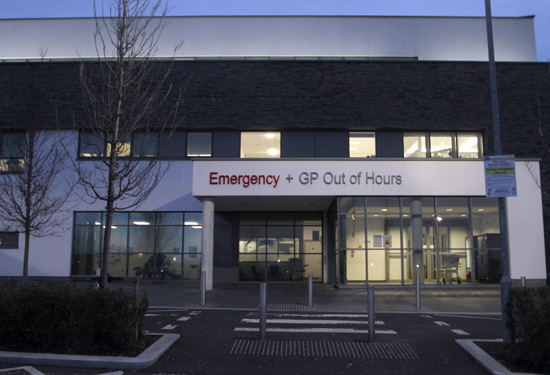A health service summit is to be held on the future shape of urgent and emergency care in Northern Ireland.
A public consultation on a proposed new regional model of care for the province as a whole will be launched later this year.

The summit and public consultation will be key stages in the review of urgent and emergency care announced by the Department of Health in November 2018.
The review is being led by John Maxwell, ED consultant at the Royal Victoria and Mater Hospitals.
Urgent and emergency care includes care provided at hospital Emergency Departments (previously called Casualty or A&E) as well as GP Out-of-hours services and Minor Injury Units.
To date, the review’s work has involved a series of discussions, including with clinicians, Royal Colleges and service users, as well as research on provision both in N Ireland and other jurisdictions.
The summit is planned for June to discuss the team’s findings on the key issues facing urgent and emergency care across Northern Ireland and to start to identify possible solutions that will inform the public consultation on the new model of care.
The Bengoa Report on transformation identified urgent and emergency care as one of the specialties “in most need of reform”.
Permanent Secretary Richard Pengelly today said: “It is very clear we need a new model of care. In particular, we need to determine the best way to meet the needs of the rising number of older people in our population.
“With demand for care continuing to rise, our hospital emergency departments remain under intense pressure.
“Unless we make changes, we will increasingly be unable to cope with the changing levels of need in our community.”
The summit will bring together clinicians, patient voices and representatives from organisations across the Health and Social Care (HSC) system.
Dr Maxwell said: “Our emergency departments continue to face serious pressures, as my colleagues across the system can testify. The level of pressure usually experienced at winter is now lasting throughout the year, and is showing no signs of letting up.
“Experience elsewhere would indicate that the answer is not to simply build bigger units, add more beds and keep trying to recruit more staff. Many people who currently attend emergency departments do not have life-threatening emergency care needs, and could be dealt with more effectively in different settings, but there is currently nowhere else for them to turn.
“We need fundamental reform – including developing alternative routes to treatment, care and admission for our older citizens.
“This is not about simply looking at the future of individual hospital sites, but at how the system works as a whole. That includes assessing how well defined the roles of emergency departments currently are and examining the potential for more urgent treatment centres, similar to the facility at Omagh Hospital.”
The review was launched following a Population Health Needs Assessment. It highlighted that demographic change is a major factor behind growing demand for urgent and emergency care, with pressures due to intensify significantly in coming years.
For example, during the 10 years between 2016 and 2026, the N Ireland population is projected to grow by a further 77,600. Of this increase, the rise in the population aged 65 and over is projected to be 74,500.
***
A number of hospital Emergency Departments have faced specific pressures in recent years, in some cases leading to unplanned changes in service provision. Last year, the Department supported the Southern Trust to produce a population health needs assessment for Newry and Mourne to provide the evidence base for a new local model of urgent and emergency care at Daisy Hill Hospital. This same approach is being used to plan the future model of urgent and emergency care for NI as a whole.
A set of 12 draft principles have been developed to guide the analysis undertaken by the review, the conclusions reached and the recommendations made. These are:
- Our primary focus is safe, high quality care for all people accessing our services.
- We commit to the principles of PPI, co-design and co-production engagement and involvement.
- All people accessing our urgent and emergency services should be cared for in a setting most appropriate to their clinical needs, including self-care.
- Fundamental change is required across the HSC in order to deliver optimum, sustainable and high quality future urgent and emergency care.
- The Review will define the best integrated urgent and emergency care arrangements for the entire population of Northern Ireland, irrespective of Trust or LCG boundaries.
- There shall be standardised delivery of urgent and emergency care services across the region to ensure that all people accessing our services, irrespective of location, can access the same standard of care.
- The new model will be implemented on a regional basis and will be responsive to local needs.
- The new model should be designed, resourced and staffed optimally to meet the population’s urgent and emergency care needs and to deliver value for money.
- The new model will enable all people accessing our services to access reliable health information in order to make informed choices about how to access the right services which best meets their clinical needs, including self-care.
- The new model will be underpinned by a comprehensive workforce plan taking into account skills mix, training and new and emerging roles, and within which staff must feel supported and respected.
- The new model will take account of, and contribute to, evidence of best practice and innovative models both locally and internationally.
- The new model should fully consider and make appropriate use of new and emerging technological advances.
























